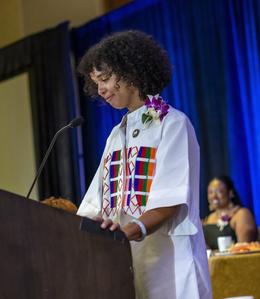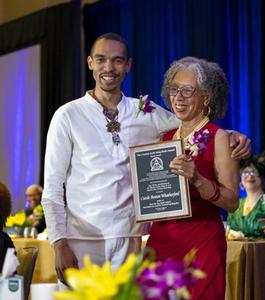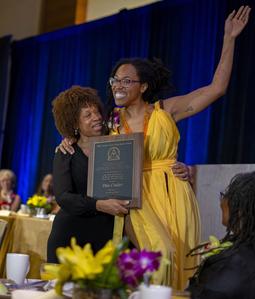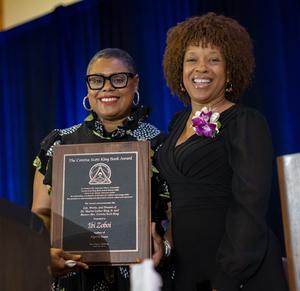This past weekend at the American Library Association's 2024 Annual Conference in San Diego, Calif., the Coretta Scott King Book Awards Round Table held the 55th annual CSK book awards breakfast. The CSK Awards honor "African American authors and illustrators for outstanding contributions to literature for children and young adults." CSKBART chair Janice Newsum noted in her opening remarks that it is "the dedication and creativity of these authors and illustrators that make this wonderful event possible."

|
|
| Jade Adia (photo: Alexus Amaka Uchendu) |
|
Many CSK speeches over the years have been marked by expressions of strong emotion and deep gratitude, and the 2024 winners and honorees continued this tradition, displaying what makes this particular event such a touching celebration. Jade Adia, the CSK-John Steptoe Author Award winner for There Goes the Neighborhood (Hyperion), opened with appreciation: "Thank you for seeing something tender in this very unconventional book." There Goes the Neighborhood is about how a flawed, young Black woman tries to fight the rising tide of gentrification in her community. The protagonist's fictional neighborhood was based on Adia's own, and the author spoke about the importance of the buildings, parks, streets that mark our everyday: "Places hold a sort of magical quality," she said. "They can act as portals... they can act as anchors." A place that made the transition from Adia's Los Angeles to the Los Angeles of the book was the Liquor Bank, where her protagonist "used to buy sour belts and chile mango pops." Speaking of the Liquor Bank brought Adia to tears: "In real life, just a couple weeks before the one-year anniversary of the publication of There Goes the Neighborhood, the [real] Liquor Bank" was knocked down. "I didn't anticipate how quickly There Goes the Neighborhood would become an archive for my changing city and particularly my experience of my city."
Briana Mukodiri Uchendu, who won the CSK-John Steptoe Illustrator Award for We Could Fly, written by Rhiannon Giddens (Candlewick), began something of a theme for the rest of the speeches by speaking about her mother. She was tearful as she recounted creating her illustrations while her mother suffered with cancer: "She told me she was proud of me, and I would do great things. I wish so badly she could be here now." Shannon Wright, who received an Illustrator Honor for Holding Her Own: The Exceptional Life of Jackie Ormes, written by Traci N. Todd (Orchard), used her time to mirror the subject of her book: "Jackie Ormes was a pioneer for women. Despite all the obstacles that put her art career in danger, she still put pen to paper and said the quiet part out loud." And so, Wright went on to say, "I hold this award and feel disheartened that Palestinian families, the families of Congo and Sudan, Indigenous families and all those in turmoil are being robbed of celebrating the very things we're celebrating today." Jerome and Jarrett Pumphrey, who won an Illustrator Honor for There Was a Party for Langston, written by Jason Reynolds (Caitlin Dlouhy Books), took turns giving their speech. "We were of two minds," Jerome said. "We were going to illustrate a Jason Reynolds book. Imagine what we could do! At the same time, we had to illustrate a Jason Reynolds book. What were we going to do?"

|
|
| Jeffery and Carole Boston Weatherford (photo: Alexus Amaka Uchendu) |
|
Vashti Harrison won both a CSK Author Honor and a CSK Illustrator Honor for her picture book Big (Little, Brown Books for Young Readers), which also won the Caldecott Medal, making Harrison the first Black woman receive the award. Big was "born of a need to express something deep inside that had been growing for over 30 years," she said, but "I didn't have the words to describe it." Carole Boston Weatherford also received two CSK Honors: an Author Honor for Kin: Rooted in Hope, illustrated by Jeffery Boston Weatherford (Atheneum), and an Author Honor for How Do You Spell Unfair?, illustrated by Frank Morrison (Candlewick). Kin, which she worked on with her son, Jeffery, is about reclaiming her ancestor's lost journeys: "Knowing your history is generational wealth." As a surprise to the author, her son took the stage to speak about her Honor for How Do You Spell Unfair? "We've all had the pleasure of watching my mother grow over the past 29 years," he said. "And I have had the blessing of watching her grow firsthand. My mother is not just a mother to me, she's a mother to Black children's books."

|
|
| LaKeshia Darden and Dare Coulter (r.) (photo: Alexus Amaka Uchendu) |
|
Dare Coulter, winner of the CSK Illustrator Award for An American Story, written by Kwame Alexander (Little, Brown), approached the mic saying, "Y'all, I am verbose and loquacious. Ya girl can talk. I'm so excited." The real award, she said, "is to be honored by all of you. I am so grateful for every closed door that led me to this moment." According to Coulter, she is the second-youngest person to win the CSK Illustrator Award, and the youngest in 25 years. "I'm 31 years old today," she said, "I can't tell you about life, but I can say thank you." This award, she mused, is about legacy. It is about community, about joining a family, about sharing: "This is a lifetime commitment and obligation, it is a North Star. I am grateful to be standing on the shoulders of those who came before me, I am grateful to be standing on the platform that you built." And, simply, books matter: "Black books matter. Books that enable us to see ourselves and reflect our humanity matter. It's important to control the narrative that we were written into."
 |
|
| Ibi Zoboi (l.) with LaKeshia Darden (photo: Alexus Amaka Uchendu) |
|
Like Adia, Ibi Zoboi, CSK Author Award winner for Nigeria Jones (Balzer + Bray), wrote a YA novel about a flawed, young Black woman holding onto and letting go of her community. The protagonist, Nigeria Jones, is raised as part of the Movement, a Black separatist group based in Philadelphia. Nigeria is homeschooled and vegan and "participates in traditional rituals to connect her and other kids from the group to their ancestors." Pan-African spaces, Zoboi said, are not "stereotypes of the '60s"--they exist today and are thriving parts of American culture. "I was born in Haiti. English was not my first language. Where I come from, writers are silenced or sent into exile." Growing up in the United States, Zoboi heard and saw "some of the worst portrayals of Haiti in the media. As I grew older, I learned that pejorative stories about Haiti are also pejorative stories about African people in this country and all around the world." And so Zoboi wanted to live, work, and raise children in "spaces that celebrate our culture, our children, and our elders." Our children, she said, deserve to grapple with self, community, nation, legacy, and "to question our ideas and forge their own paths." Specifically speaking about Black girls, Zoboi said, "We are intelligent, we are articulate, we are well-read, we love our families and our people, and we are invaluable to the founding of this country even though we were never written into its constitution or laws. Liberate a girl, liberate a people."
The final award of the morning was the Coretta Scott King-Virginia Hamilton Award for Lifetime Achievement, which went to Christopher Paul Curtis, who won the 2000 Newbery and CSK for Bud, Not Buddy (Delacorte) as well as three Newbery honors and a second CSK award for Elijah of Buxton (Scholastic). Like Uchendu, Curtis's mother was a focus of his speech. Curtis spoke comfortably, jokingly, happily about joining what he called the "Mount Rushmore of Black authors of books for young people": "To say I'm honored is not enough. I am beyond thrilled." Curtis noted that there had been many tributes to mothers over the course of the morning, "so, I have to pay tribute to my father. Thank you so much, Dad. But, as many of us are fortunate enough to know and appreciate, there's something special about Mom." Curtis's mother, Leslie Jane Curtis, who died in 2012, was the first Black female student to live in the dorms at Michigan State. Although she must have experienced terrible racism and bigotry while there, she never shared these stories with her children. "Wisdom comes slowly," Curtis said. "It's taken me all these years to appreciate all the sacrifices my mother made for me. She knew hatred is the heaviest and most destructive of all crosses to bare." --Siân Gaetano, children's and YA editor, Shelf Awareness

